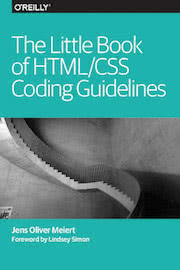What’s in a Guideline? Win a Copy of the Little Book of HTML/CSS Coding Guidelines!
Published on Apr 14, 2016 (updated Dec 5, 2021), filed under development. (Share this post, e.g. on Mastodon or on Bluesky.)
Coding guidelines are important. Only one-man teams wouldn’t need them—and yet when working alone we should still look into working with some standards.
What we need to keep in mind around coding guidelines is pretty well-documented by now, and I’m very happy to point to e.g. styleguides.io or cssguidelin.es. And yet I myself had just the other month published The Little Book of HTML/CSS Coding Guidelines, which discusses the theory and practice of coding guidelines in some detail.
Five signed editions of the physical version of the book, now, I’ll give away for free—and even throw in an extra signed copy of The Little Book of HTML/CSS Frameworks.
To win you have until April 30 to comment here or tweet (to @j9t), why you deem coding guidelines important or what you find to be the most useful coding guideline.
I’ll check the comments and tweets for all answers and semi-randomly select the five (six) winners, and announce them on a follow-up post on this site together with their responses. The winners must then please contact me through this site so that I can send them their copies (through standard mail, for which I’ll be covering for shipping fees up to $10 each). Note that I’ll bet everything on mutual trust, and that there’s no legal entitlement, claim, regress, appeal, or whatever else there is. Good luck!
By the way, the ebook versions of both books are still free, so well grab your own copy now: The Little Book of HTML/CSS Coding Guidelines, and the The Little Book of HTML/CSS Frameworks.
About Me
I’m Jens (long: Jens Oliver Meiert), and I’m an engineering lead, guerrilla philosopher, and indie publisher. I’ve worked as a technical lead and engineering manager for companies you use every day (like Google) and companies you’ve never heard of, I’m an occasional contributor to web standards (like HTML, CSS, WCAG), and I write and review books for O’Reilly and Frontend Dogma.
I love trying things, not only in web development and engineering management, but also in philosophy. Here on meiert.com I talk about some of my experiences and perspectives. (Please share feedback: Interpret charitably, but do be critical.)


